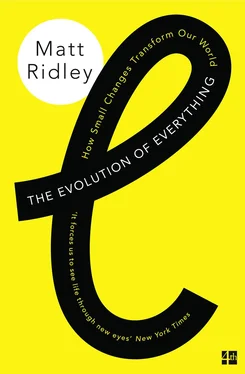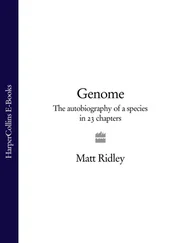The more we understand genomics, the more it confirms evolution.
5 5. The Evolution of Culture 6. The Evolution of the Economy 7. The Evolution of Technology 8. The Evolution of the Mind 9. The Evolution of Personality 10. The Evolution of Education 11. The Evolution of Population 12. The Evolution of Leadership 13. The Evolution of Government 14. The Evolution of Religion 15. The Evolution of Money 16. The Evolution of the Internet Epilogue: The Evolution of the Future Footnotes Sources and Further Reading Index Acknowledgements By the Same Author About the Publisher
The Evolution of Culture 5. The Evolution of Culture 6. The Evolution of the Economy 7. The Evolution of Technology 8. The Evolution of the Mind 9. The Evolution of Personality 10. The Evolution of Education 11. The Evolution of Population 12. The Evolution of Leadership 13. The Evolution of Government 14. The Evolution of Religion 15. The Evolution of Money 16. The Evolution of the Internet Epilogue: The Evolution of the Future Footnotes Sources and Further Reading Index Acknowledgements By the Same Author About the Publisher
And therefore to assume there was one person gave a name
To everything, and that all learned their first words from the same,
Is stuff and nonsense. Why should one human being from among
The rest be able to designate and name things with his tongue
And others not possess the power to do likewise? …
Lucretius, De Rerum Natura , Book 5, lines 1041–5
The development of an embryo into a body is perhaps the most beautiful of all demonstrations of spontaneous order. Our understanding of how it happens grows ever less instructional. As Richard Dawkins writes in his book The Greatest Show on Earth , ‘The key point is that there is no choreographer and no leader. Order, organisation, structure – these all emerge as by-products of rules which are obeyed locally and many times over.’ There is no overall plan, just cells reacting to local effects. It is as if an entire city emerged from chaos just because people responded to local incentives in the way they set up their homes and businesses. (Oh, hang on – that is how cities emerged too.)
Look at a bird’s nest: beautifully engineered to provide protection and camouflage to a family of chicks, made to a consistent (but unique) design for each species, yet constructed by the simplest of instincts with no overall plan in mind, just a string of innate urges. I had a fine demonstration of this one year when a mistle thrush tried to build a nest on the metal fire escape outside my office. The result was a disaster, because each step of the fire escape looked identical, so the poor bird kept getting confused about which step it was building its nest on. Five different steps had partly built nests on them, the middle two being closest to completion, but neither fully built. The bird then laid two eggs in one half-nest and one in another. Clearly it was confused by the local cues provided by the fire-escape steps. Its nest-building program depended on simple rules, like ‘Put more material in corner of metal step.’ The tidy nest of a thrush emerges from the most basic of instincts.
Or look at a tree. Its trunk manages to grow in width and strength just as fast as is necessary to bear the weight of its branches, which are themselves a brilliant compromise between strength and flexibility; its leaves are a magnificent solution to the problem of capturing sunlight while absorbing carbon dioxide and losing as little water as possible: they are wafer-thin, feather-light, shaped for maximum exposure to the light, with their pores on the shady underside. The whole structure can stand for hundreds or even thousands of years without collapsing, yet can also grow continuously throughout that time – a dream that lies far beyond the capabilities of human engineers. All this is achieved without a plan, let alone a planner. The tree does not even have a brain. Its design and implementation emerge from the decisions of its trillions of single cells. Compared with animals, plants dare not rely on brain-directed behaviour, because they cannot run away from grazers, and if a grazer ate the brain, it would mean death. So plants can withstand almost any loss, and regenerate easily. They are utterly decentralised. It is as if an entire country’s economy emerged from just the local incentives and responses of its people. (Oh, hang on …)
Or take a termite mound in the Australian outback. Tall, buttressed, ventilated and oriented with respect to the sun, it is a perfect system for housing a colony of tiny insects in comfort and gentle warmth – as carefully engineered as any cathedral. Yet there is no engineer. The units in this case are whole termites, rather than cells, but the system is no more centralised than in a tree or an embryo. Each grain of sand or mud that is used to construct the mound is carried to its place by a termite acting under no instruction, and with no plan in (no) mind. The insect is reacting to local signals. It is as if a human language, with all its syntax and grammar, were to emerge spontaneously from the actions of its individual speakers, with nobody laying down the rules. (Oh, hang on …)
That is indeed exactly how languages emerged, in just the same fashion that the language of DNA developed – by evolution. Evolution is not confined to systems that run on DNA. One of the great intellectual breakthroughs of recent decades, led by two evolutionary theorists named Rob Boyd and Pete Richerson, is the realisation that Darwin’s mechanism of selective survival resulting in cumulative complexity applies to human culture in all its aspects too. Our habits and our institutions, from language to cities, are constantly changing, and the mechanism of change turns out to be surprisingly Darwinian: it is gradual, undirected, mutational, inexorable, combinatorial, selective and in some vague sense progressive.
Scientists used to object that evolution could not occur in culture because culture did not come in discrete particles, nor did it replicate faithfully or mutate randomly, like DNA. This turns out not to be true. Darwinian change is inevitable in any system of information transmission so long as there is some lumpiness in the things transmitted, some fidelity of transmission and a degree of randomness, or trial and error, in innovation. To say that culture ‘evolves’ is not metaphorical.
The evolution of language
There is an almost perfect parallel between the evolution of DNA sequences and the evolution of written and spoken language. Both consist of linear digital codes. Both evolve by selective survival of sequences generated by at least partly random variation. Both are combinatorial systems capable of generating effectively infinite diversity from a small number of discrete elements. Languages mutate, diversify, evolve by descent with modification and merge in a ballet of unplanned beauty. Yet the end result is structure, and rules of grammar and syntax as rigid and formal as you could want. ‘The formation of different languages, and of distinct species, and the proofs that both have been developed through a gradual process, are curiously parallel,’ wrote Charles Darwin in The Descent of Man .
This makes it possible to think of language as a designed and rule-based thing. And for generations, this was the way foreign languages were taught. At school I learned Latin and Greek as if they were cricket or chess: you can do this, but not that, to verbs, nouns and plurals. A bishop can move diagonally, a batsman can run a leg bye, and a verb can take the accusative. Eight years of this rule-based stuff, taught by some of the finest teachers in the land for longer hours each week than any other topic, and I was far from fluent – indeed, I quickly forgot what little I had learned once I was allowed to abandon Latin and Greek. Top–down language teaching just does not work well – it’s like learning to ride a bicycle in theory, without ever getting on one. Yet a child of two learns English, which has just as many rules and regulations as Latin, indeed rather more, without ever being taught. An adolescent picks up a foreign language, conventions and all, by immersion. Having a training in grammar does not (I reckon) help prepare you for learning a new language much, if at all. It’s been staring us in the face for years: the only way to learn a language is bottom–up.
Читать дальше












